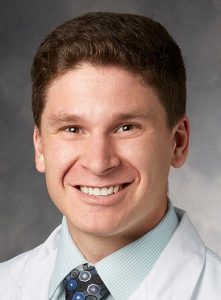
Presented by: Daniel Joseph Stoltz, MD, Resident in General Surgery, Department of Surgery
Talk Title: “Preventative Health Screening in Veterans With Obesity Seeking Bariatric Surgery: The Role of a Specialty Surgery Clinic.”
Bio: Dan Stoltz is a Stanford General Surgery resident currently in his second year of Professional Development time. He is funded by the Chan Zuckerberg Biohub Physician-Scientist Fellowship Program, the Division of Abdominal Transplantation, and a Professional Development Resident Award through the Division of General Surgery. Current research interests include translational diagnostics and clinical outcomes in pediatric abdominal transplantation, as well as clinical interventions for obese patients seeking bariatric surgery
Each week, S-SPIRE hosts an in-person Work-In-Progress session (WIP) for faculty members and trainees to present their research and receive feedback on projects in every phase of development—from drafting specific aims pages, to parsing grant review committee comments, to abstracts/papers/methods in preparation.
Please refer inquiries to Ana Mezynski at mezynski@stanford.edu
Title: “The Physiologic Basis of the Operative Experience: The WHOOP Study”
Presented by the WHOOP Study Team:
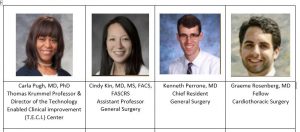
Each first Monday of every month, S-SPIRE hosts a Zoom Work-In-Progress session (WIP) for faculty members and trainees to present their research and receive feedback on projects in every phase of development—from drafting specific aims pages, to parsing grant review committee comments, to abstracts/papers/methods in preparation.
Please contact Ana Mezynski at mezynski@stanford.edu for Zoom dial-in instructions.

Presented by: Aaron Dawes, MD
Assistant Professor of Surgery, General Surgery, Stanford
Talk Title: “The Effect of Managed Care on Access and Quality for Medicaid Patients with Colon Cancer”
Bio:
Dr. Dawes is a board-certified, fellowship-trained colon and rectal surgeon. He is also an Assistant Professor in the Department of Surgery, Division of General Surgery at Stanford University School of Medicine.
Dr. Dawes treats a wide variety of conditions involving the colon, rectum, and anus, always leveraging the latest evidence and technologies. He is fully trained in minimally invasive surgical techniques–including laparoscopic, robotic, and trans-anal minimally invasive surgery–and strives to employ them, whenever possible, in an effort to reduce pain and shorten recovery.
Each week, S-SPIRE hosts an in-person Work-In-Progress session (WIP) for faculty members and trainees to present their research and receive feedback on projects in every phase of development—from drafting specific aims pages, to parsing grant review committee comments, to abstracts/papers/methods in preparation.
Please refer inquiries to Ana Mezynski at mezynski@stanford.edu

Presented by: Aaron Dawes, MD
Assistant Professor of Surgery, General Surgery, Stanford
Part 2
Talk Title: “The Effect of Managed Care on Access and Quality for Medicaid Patients with Colon Cancer”
Bio:
Dr. Dawes is a board-certified, fellowship-trained colon and rectal surgeon. He is also an Assistant Professor in the Department of Surgery, Division of General Surgery at Stanford University School of Medicine.
Dr. Dawes treats a wide variety of conditions involving the colon, rectum, and anus, always leveraging the latest evidence and technologies. He is fully trained in minimally invasive surgical techniques–including laparoscopic, robotic, and trans-anal minimally invasive surgery–and strives to employ them, whenever possible, in an effort to reduce pain and shorten recovery.
Each week, S-SPIRE hosts an in-person Work-In-Progress session (WIP) for faculty members and trainees to present their research and receive feedback on projects in every phase of development—from drafting specific aims pages, to parsing grant review committee comments, to abstracts/papers/methods in preparation.
Please refer inquiries to Ana Mezynski at mezynski@stanford.edu
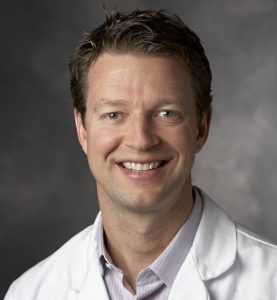
Presented by: Thomas Weiser, MD, MPH
Associate Professor of Surgery | Section of Trauma, Critical Care, and Acute Care Surgery
Director of Global Engagement | Department of Surgery
Talk Title: “CLEAN-CS: A cluster-randomized stepped wedge interventional trial evaluating an adaptive, multimodal intervention to reduce postoperative infections following cesarean delivery in Ethiopia”
Bio:
Dr. Thomas Weiser is a general and trauma surgeon, and surgical intensivist. He treats and cares for injured patients and those with acute surgical emergencies as well as manages critically ill surgical patients in the Intensive Care Unit.
His research is focused on evaluating the role surgical care plays in the delivery of health services in resource poor settings, in particular low and middle income countries. He is interested in barriers to access and provision of surgical care, the quality of surgical services, and outcomes research as well as the science of implementation, how improvements can be made, and how to strengthen compliance with best practices and change behaviors for the better. He also has an interest in domestic policy as it relates to trauma outcomes, trauma systems, insurance coverage and costs of care, and firearm violence.
Each week, S-SPIRE hosts an in-person Work-In-Progress session (WIP) for faculty members and trainees to present their research and receive feedback on projects in every phase of development—from drafting specific aims pages, to parsing grant review committee comments, to abstracts/papers/methods in preparation.
Please refer inquiries to Ana Mezynski at mezynski@stanford.edu
Each first Monday of every month, S-SPIRE hosts a Zoom Work-In-Progress session (WIP) for faculty members and trainees to present their research and receive feedback on projects in every phase of development—from drafting specific aims pages, to parsing grant review committee comments, to abstracts/papers/methods in preparation.
Please contact Ana Mezynski at mezynski@stanford.edu for Zoom dial-in instructions.

Presented by: Griffin Olsen, MD, Stanford-Intermountain Fellow, Population Health, Delivery Science, and Primary Care Masters Student in Health Policy
Talk Title: “How do surgeons understand their performance?”
Bio:
Dr. Olsen works at the Intermountain Healthcare Delivery Institute and is a master’s student in health policy at Stanford University. His work focuses on evidence-based practice implementation across the Intermountain system with the aim of “helping people live the healthiest lives possible.” Dr. Olsen is helping Intermountain establish a performance tracking system for its high-value surgeon network to ensure quality and affordability for patients.
Each week, S-SPIRE hosts a hybrid Work-In-Progress session (WIP) for faculty members and trainees to present their research and receive feedback on projects in every phase of development—from drafting specific aims pages to parsing grant review committee comments, to abstracts/papers/methods in preparation.
Please refer inquiries to Ana Mezynski at mezynski@stanford.edu
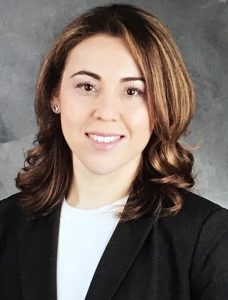
Presented by: Dr. Drudi, Assistant Professor, Vascular Surgery, Centre Hospitalier de l’Université de Montréal (CHUM)
Talk Title: “Community Engagement for Improving Limb Salvage Care in Quebec: A Mixed-Methods Study.”
Bio:
Dr. Drudi is an Assistant Professor in Vascular Surgery at the Centre Hospitalier de l’Université de Montréal (CHUM) and Surgeon-Scientist at the Centre de Recherche du CHUM (CRCHUM). She completed her residency training in Vascular Surgery and MSc in Epidemiology, Biostatistics and Occupational Health at McGill University, fellowship in complex endovascular surgery for limb salvage, and currently pursuing a Diploma of Implementation Science at UCSF. Her research interests include clinical outcomes and health services research as it pertains to frailty and marginalized communities in Quebec, Canada.
Each week, S-SPIRE hosts an in-person Work-In-Progress session (WIP) for faculty members and trainees to present their research and receive feedback on projects in every phase of development—from drafting specific aims pages, to parsing grant review committee comments, to abstracts/papers/methods in preparation.
Please refer inquiries to Ana Mezynski at mezynski@stanford.edu
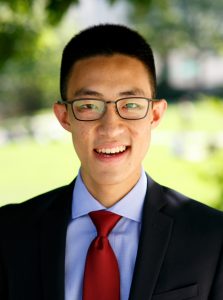
Presented by: Charles Liu, MD
Resident, General Surgery, Stanford
Talk title: “Predictive Value of Clinical Complete Response After Chemoradiation for Rectal Cancer”
Bio:
I am a general surgery resident at Stanford University. I am interested in colorectal surgery, health policy and health services research, and access to and outcomes of surgical care in underserved populations, both in the US and abroad.
Each week, S-SPIRE hosts an in-person Work-In-Progress session (WIP) for faculty members and trainees to present their research and receive feedback on projects in every phase of development—from drafting specific aims pages, to parsing grant review committee comments, to abstracts/papers/methods in preparation.
Please refer inquiries to Ana Mezynski at mezynski@stanford.edu